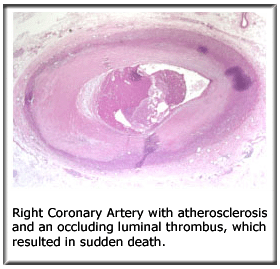 |
|
Research
Interests The laboratory is seeking to understand the biochemical processes resulting in atherosclerosis in order to combat this pervasive disease. Atherosclerosis is characterized by the development of necrotic/lipid cores within the intima of arteries at particular sites in the circulation. These necrotic/lipid cores form in the setting of a pre-existing intimal hyperplasia, characterized by the proliferation of smooth muscle like cells within the intima. The laboratory is investigating both the mechanisms of signal transduction responsible for the formation of the pre-atherosclerotic intimal hyperplasia, as well as the factors stimulating the formation of intimal necrotic/lipid cores. Specific projects in the laboratory include elucidation of the biochemical pathways by which low levels of hydrogen peroxide stimulate cell proliferation in the vessel wall, and determination of the vascular extracellular matrix alterations in humans that promote the development of atherosclerosis. |
|
|
©2012 James R. Stone Lab - Department of Pathology - Massachusetts General Hospital |
